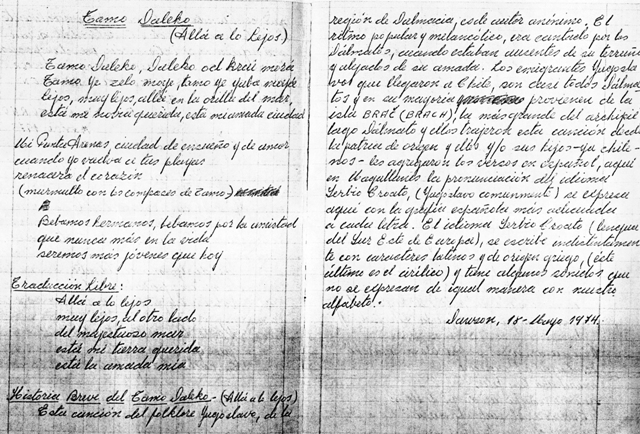 Cantos Cautivos
Cantos Cautivos
Far Away (Tamo daleko)
Baldovino invites Daniel to lead the choir in a song. "El Negro Ruiz" (*), as he is amicably known, has been a radioman his whole life, and now he never lets go of a small tape recorder he keeps in his left hand.
This affable and portly man is highly esteemed as a storyteller, specialising in the romantic poetry of Neruda. He travels across Patagonia in lengthy poetry tours, delivering “el amor que se reparte en besos, lecho y pan” (the love that is shared with kisses, couch and bread), or the “amor que puede ser eterno y puede ser fugaz” (love that can be eternal and can be fleeting).
At the time of the coup, Ruiz was down in Tierra del Fuego, visiting his brother's house. As he himself points out:
"Soon, the first sinister list came up containing my name, demanding that I immediately report to the police or a military barracks. When the proclamation was read out, mocking laughter could be heard from the loudspeaker saying that those named would be confined to Dawson Island. I refused to cross on horseback into Argentina. I told my comrades that I had committed no crime and had resolved to surrender myself.
The basement of a house on Cerro Sombrero was my first prison. I was taken to the gym of the Pudeto Regiment in Punta Arenas in handcuffs. I was transferred to Dawson Island aboard the navy ship "Serrano" on 21 December 1973. I’d also been a regular guest at the Pudeto rat hole, the House of Sport, and the Cochrane Regiment. In a split ruling, I was given a suspended sentence of 541 days, and as I had served this time, an order was given for my conditional release, but this never happened. By decree, I was to be kept imprisoned in the Cochrane barracks until May 1975. I was then confined to Chiloé, where I lived with my family until December 1979.” (**)
Along with Ruiz, the rest of the choir comes forward, among whom I can also make out Américo, Jerónimo, the brother of Aristóteles, the pharmacist Antonio, and Gastón, all older men.
They begin singing "Tamo daleko", a nostalgic melody in waltz rhythm, which has always been associated with Magallanes because of its moderate tone. It becomes fiercer as the song progresses. I notice that most of the men from Magallanes know the song, and several join to the choir with tears rolling down their cheeks. The melody goes on repeating the verses in Serbo-Croatian and ends with references to their beloved city.
Music has an undeniable evocative power. As we began to listen to "Tamo daleko", I was struck by the memory of a grey afternoon in Río Chico, when we were locked up in the barracks due to a rainstorm. It was there, amid the racket caused by the downpour on our paper-thin, corrugated metal walls, that this melancholic song emerged, sung by the comrades from Punta Arenas, and deepening the nostalgia which that afternoon had us all feeling quite depressed.
Carlos remembers this song from our time together in the FECH (University of Chile Students' Union) in the 1950s. It was often sung by students of Yugoslav origin. The Federation of Balkan nationalities had closed down, having previously been in existence up until the fall of the Berlin wall.
Américo, a farmer and Communist Party leader, who was also held prisoner on the island, has sent me a photocopy containing the text of this beautiful song and a brief history of its origin, handwritten in Dawson in May 1974 and reproduced here.

Manuscript, Dawson Island, 1974.
Tags:
Published on: 12 January 2015
Ex-political prisoners of Dawson Island in 2007. Filmed by documentary maker Jorge Grez Leuquén, who recorded stories of the dictatorship's detainees.
daleko kraj mora
tamo je selo moje
tamo je ljubav mojaTranslation from Serbian:
Over there, far away
away by the sea
there is my village
there is my love..
Far, far away
there along the seashore
is my beloved sweetheart
and is my beloved hometown.
My Punta Arenas
city of dreams and love
when I come back to your beaches
my heart will be reborn.
Let’s toast, brothers
let’s toast to love
for never again in our lives
will we be younger than we are today.
Testimonies from the Cantos Cautivos platform can be cited and shared as long as they are attributed (including the author, our project’s name and URL), for non-commercial purposes and without modifications, as per the Attribution-NonCommercial-NoDerivatives Creative Commons licence (CC BY-NC-ND 4.0). Authorisation is required for 1) any reuse different from citations and sharing via the CC BY-NC-ND 4.0 license of the platform data and its associated metadata, and 2) any use in events, concerts, plays, films, etc., of musical works written or recorded by project participants. To that end, we request that you send a proposal at least one month in advance to contact@cantoscautivos.org. For uses of musical works written or recorded by people outside the project, please contact copyright holders.








